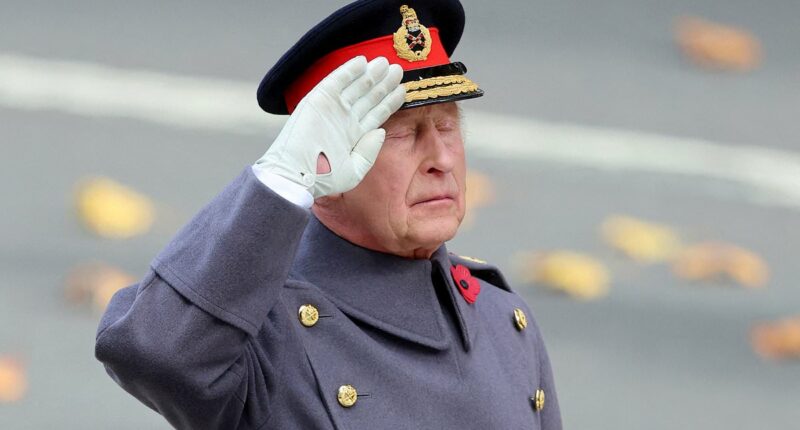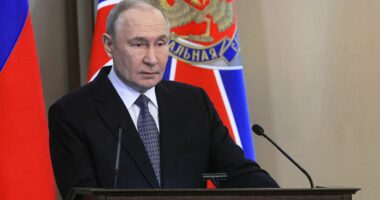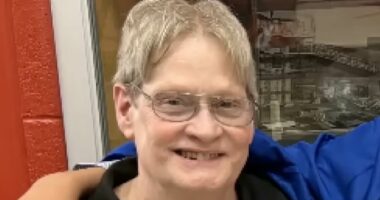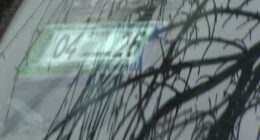Share this @internewscast.com
A sense of solemn duty and renewed order was palpable yesterday as the King led the nation in a poignant Remembrance ceremony at the Cenotaph on Whitehall.
By 8 a.m., over 10,000 people had gathered along the pavements to pay their respects.
As the National Anthem concluded and the crowd erupted into spontaneous applause, it was clear that this day of national reflection arrived at a most fitting moment.
The King navigated a challenging two weeks, culminating in the unprecedented decision to revoke his disgraced younger brother Andrew Mountbatten Windsor’s royal titles.
Adding to the nation’s somber mood, a recent poll revealed a stark decline in national pride, with half of respondents feeling the UK is changing too rapidly.
In this context, 100-year-old World War II veteran Alec Penstone startled viewers on Good Morning Britain by questioning whether his comrades’ sacrifices had been worthwhile.
However, for a country seemingly so divided, this was a day to come together. And one given added poignancy, too, by the knowledge that this year marks the 80th anniversary of Victory in Europe and the end of the Second World War.
‘Eighty years is an awful long time,’ veteran Flight Sergeant Jack Ruck, 100, told me yesterday afternoon. ‘I’ve lost all my pals now. I’ve only got their children to keep me company.’

King Charles stared solemnly as he saluted in front of the Cenotaph to mark Remembrance Day

The Princess of Wales watched on alongside Queen Camilla as an impeccable two-minute silence was held
Indeed, yesterday’s commemoration will likely be one of the last witnessed by veterans who fought the Axis forces in 1945, of which around 20 were present on Sunday, the oldest being 101-year-old Arthur Oborne.
As if to drive this point home, there were just three D-Day veterans representing the Spirit of Normandy Association, half the number that came last year.
After hours of waiting in the autumnal chill, the sun emerged just as the Foot Guards Band performed Elgar’s rousing Nimrod shortly before the royal delegation – led by the Monarch and followed by Princes William and Edward – entered Whitehall, just shy of 11am.
The Queen and the Princess of Wales – both cloaked in black – looked down from the central balcony of the Foreign and Commonwealth Office, while Princess Anne, who is currently in Australia, observed Remembrance at the Anzac Memorial in Sydney.
As Big Ben struck 11, the two-minute silence began. Quietude came easy for Prime Minister Keir Starmer and Tory leader Kemi Badenoch, standing next to each other, as the pair observe a glacial indifference at the best of times.
The Leader of the Opposition rose to the occasion, quite literally, in dauntingly high heels – a courageous option when there is wreath-laying to be done.
Behind them stood the line-up of living former prime ministers, a spectrum of hair shades ranging from Rishi Sunak’s salt and pepper to John Major’s snowy white.
They were joined by representatives from the Crown Dependencies and UK overseas territories, and faith leaders and dignitaries from across the Commonwealth – including 49 High Commissioners from as far afield as St Lucia and Sierra Leone.
There was no Nigel Farage, despite his party leading many polls, as custom dictates only party leaders with six or more seats in Parliament participate. Reform UK has just five.

Prime Ministers past and present, including David Cameron, Tony Blair and Gordon Brown, paid their respects as they lined up by the Cenotaph

The Prince and Princess of Wales arrive for the National Service of Remembrance at the Cenotaph
In time-honoured tradition, the two-minute silence was brought to a close by The Last Post played by the buglers of the Royal Marines. Little has changed of this ceremony over more than a century – its proceedings comfortingly familiar to any who witnessed the then Prince Charles lay his first wreath 53 years ago, bar the forest of smartphones held aloft by spectators.
The King – as Commander in Chief of the Armed Forces – laid a wreath composed of 41 poppies and mounted on an arrangement of black leaves, as is tradition.
The wreath was completed by a ribbon and bow in scarlet, purple and gold, a nod to his royal racing silks. Shortly before midday, 10,000 veterans – many in wheelchairs – began the March Past organised by the Royal British Legion to dignified applause that continued for a good hour.
It was impossible not to be moved as the veterans – one by one – removed their berets in tribute to their fallen comrades as they passed the Cenotaph, that Portland stone monument to the Fallen designed by Sir Edwin Lutyens.
Military charity Fighting With Pride also took part, marking the 25th anniversary since the ban on LGBT personnel in the Armed Forces was lifted and just a fortnight since the King unveiled a memorial to LGBT service people at the National Memorial Arboretum in Staffordshire.
A special mention must go to the King’s Bodyguard of the Yeoman of the Guard, which celebrated the 540th year since its formation by Henry VII following the Battle of Bosworth in 1485, which began the Tudor dynasty. Today, the 73 Yeoman of the Guard serve a ceremonial role in royal life.
Marking its 15th anniversary was Scotty’s Little Soldiers, a charity started by Nikki Scott to help bereaved Forces children following the death in Afghanistan of her husband, Lee Scott of the 2nd Royal Tank Regiment, in 2009.
Part of the troop was eight-year-old Evie Roots, the youngest member of this year’s March Past who walked – clad in the charity’s black and yellow colours – in honour of her late father Adam Roots who served with the Army Air Corps and tragically died in a parachute accident in July 2018.

King Charles III followed by the Prince of Wales, (left) and the Duke of Edinburgh (right)

Prime Minister Sir Keir Starmer lays a wreath during the Remembrance Sunday service
This year, the Duke of Edinburgh took the salute of the March Past from Horse Guard’s Parade, and was aided by his equerry, the dashing young Captain the Honourable Will Jack, for whom the day held further poignancy as his wife was at home expecting the birth of their first child.
It was a particularly special day for Jack Ruck who was celebrating his 100th birthday by taking part in the march past for the first time. Jack joined the RAF at the age of 17 and went on to serve in Egypt as a gunner on Ansons and Baltimore Bombers.
‘I can’t believe I’ve finally made it,’ a visibly moved Jack told me on Horse Guard’s Parade later, standing resolutely beside his wheelchair. ‘I usually watch it on the TV. But I wanted to come and pay my respects to the blokes that made this country what it is. There’s no place like England.’
‘He’s marvellous,’ Jack said of his 38-year-old grandson, Squadron Leader Alex Ruck, who followed his ‘inspirational grandfather’ into the Royal Air Force. ‘He’s reliable, daring and never stops. He deserves more medals!’
A new centenarian, Jack’s wish is to receive a letter from the King. ‘I think the world of Charles,’ he said. ‘Perhaps my letter will be waiting on the doormat when I get home.’
On a day to give thanks, a word must also be said for London’s inimitable black cabbies who collectively donated around 1,000 free journeys to help veterans to and from the commemoration as part of the ‘Poppy Cabs’ initiative.

Veterans on Whitehall ahead of the Remembrance Sunday service at the Cenotaph

Services will also take place across the country to honour the fallen
With so many now elderly and infirm, this is a service without which many veterans would simply not have been able to attend at all.
A sobering reminder, indeed, of the financial hardship faced by so many veterans, a scandal that the Royal British Legion’s (RBL) annual Poppy Appeal goes some small way to addressing.
This year, the RBL hopes to raise over £50million to support the Armed Forces community across Britain. Last year alone, RBL provided welfare support to more 22,000 struggling people.
One D-Day veteran who was not present was Mr Penstone, who had decided against attending at the last minute following his appearance on Friday’s Good Morning Britain.
His words should serve as a sobering reminder to Prime Minister Sir Keir, and the other Government ministers assembled yesterday, that remembrance isn’t just about laying a wreath in front of the Cenotaph once a year, it’s working ever harder to tend the flame of freedom for which Mr Penstone’s comrades laid down their lives.
















